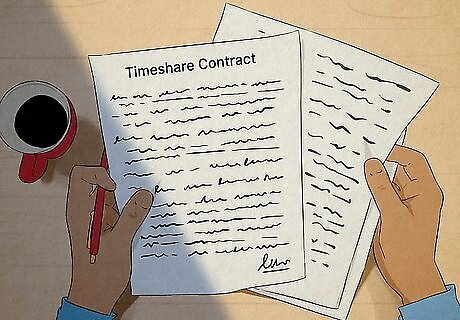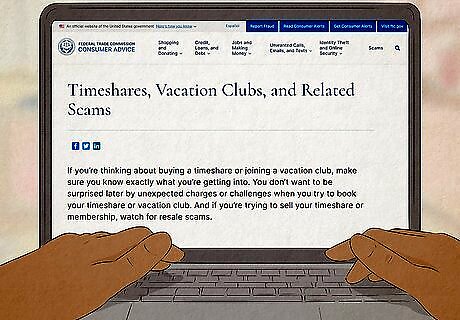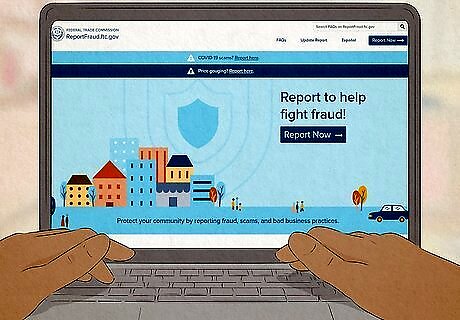
views
- Not all timeshares are scams, but there are scams out there. Becasue of this, it's important that you're very careful.
- Avoid falling prey to timeshare purchasing or reselling scams by researching the timeshare or resale company beforehand to make sure they're legitimate.
- Take your time signing any contracts, and get everything in writing. Be extremely wary of resellers who insist you pay upfront.
How to Avoid Timeshare Purchasing Scams

Research the timeshare company before going into a presentation. The best way to tell if a company is legitimate and if their presentation is worth attending is by researching them beforehand. Check out their website and see what you’d be signing up for: What fees are included? What does the place look like? Most importantly, what have other customers said about them? If you have any friends who’ve invested in timeshares, ask them about their experience and if they recommend their company. If you don’t know anyone who’s bought a timeshare, check out different companies’ reviews on Google to see if they’ve received any complaints or if they seem to be on the up-and-up. Keep in mind that some companies will post fake positive reviews, so even if there are only a couple negatives and hundreds of raves, read all the negatives and take them seriously. There are a few telltale signs a review is phony: It copies what other reviews have said. It’s very short and unspecific (like “great” or “highly recommend”). It’s suspiciously effusive in its praise (“I could not ask for a better experience! What a timeshare! You simply must try it!”). You notice a burst of positive reviews over a short span of time.

Keep a cool head during the presentation. Know ahead of time that these presenters will say just about anything to convince you to sign that contract today! Being prepared for the pitch of a lifetime will help you feel less overwhelmed and therefore less likely to cave in. Often, presenters will pressure you to commit to a timeshare with one-day-only deals. Ask them if you really can’t have the same deal after thinking the purchase over. Impulse buying at Forever 21 might not be a big deal, but a timeshare is a major purchase, and no legitimate salesperson would expect you to commit to it without pausing to think first. Even if you plan to attend a timeshare presentation just for the snacks or the promise of free baseball tickets or whatever, make sure you know what you’re getting into. Those salespeople are trained to convince you to hand over thousands of dollars—even if you initially went in with a clear head.

Ask the salesperson about their cancellation policy. You’ve probably dealt with buyer’s remorse before (been there, done that). Your right of rescission, also called the “cooling-off period,” refers to your right to back out of a contract after signing it. The timeshare contract may have a specific date by which you can cancel your contract, or you can refer to your state’s laws regarding your right of rescission.

Study all paperwork before signing anything. You’ll be pushed to sign a contract before leaving the presentation, but resist the pressure. Take the contract home with you before signing anything, and have someone you trust (ideally, a lawyer) sit down with you to review everything before you commit. In the same vein, get everything in writing that you can—don’t take your salesperson’s word that they can get you that special deal unless you’ve got written proof of it. In fact, assume that if you don't get something in writing, it's not going to happen. If they avoid giving you written documentation of anything you ask for, it’s probably a scam.
How to Avoid Resale Timeshare Scams

Refer to the timeshare developer or management company for options. There are lots of companies out there promising to resell timeshares for big bucks, but unfortunately, many of them are scams. If you buy a timeshare and decide you'd like to sell it, try contacting the timeshare developer or the resort’s management company to understand your resale options before turning to a reseller. Many timeshare companies already have a plan in place for timeshare owners to resell their property, or they may have resources to check out. The FTC also suggests checking out Responsible Exit, a tool crafted by the American Resort Development Association (ARDA) for helping you safely navigate reselling your timeshare.

Be suspicious of any unsolicited offers to resell the property. Scammers will often come out of the woodwork to offer to take a timeshare off your hands, even before you’re planning to resell. If you get a random email or phone call from someone claiming to work for a resale company, treat them with extreme suspicion. Reach out to the timeshare management company and see if they’ve had any reports of recent scams: you may be one of many targets.

Do background checks on resellers. Stay alert to sketchy resale companies to avoid being scammed. Some resellers are legitimate, but many aren't. Doing your homework before committing to anything could save you a lot of time, energy, and money in the long run. Reach out to the state attorney general or local consumer protection agencies in the reseller’s state. If they have any complaints on file for the reseller, it’s a red flag. Look up reviews online for the reseller. Have any customers voiced complaints about the company, or do they seem legitimate? Be sure to keep an eye out for phony reviews. Phony reviews are likely to be repetitive, have typos, be unspecific, or appear rapid-fire over a short span of time.

Ask the reseller what fees they charge. If a reseller insists you pay in advance based on their “guarantee” that they’ll sell your property, it’s likely a scam. Be sure to get a refund policy in writing prior to handing over money in advance. If possible, only do business with a reseller who takes payment after selling a property. Also be aware that some scammers will falsely claim you’re entitled to property or funds you aren’t aware of, and that to obtain them you must pay a fee. Do not pay this fee!

Be sure the resale agents and brokers are licensed. If the resale company is a scam, their agents probably won’t be licensed. Ensuring their agents are licensed—and that they are licensed in the state where the timeshare is located—is one way to tell if the company is on the up-and-up. Request references from past clients. Google the names of the agents and brokers. Do as much background checking as you can to determine if the company is honest or not. Every U.S. broker must be registered with the SEC. Search your broker’s name on Investor.gov to make sure they’re legitimate.

Ask the reseller how they’ll promote your timeshare property. Basically, what are they going to do that you couldn’t do yourself? Are they just going to post your timeshare on a resale list, or are they going to advertise your unit? Knowing exactly what their process is and what they plan to do to promote your property is imperative in deciding whether to work with this company.

Get everything in writing. No matter how charming or kind or sincere a reseller seems, don’t just take them at their word. Get everything in writing, even if it seems irrelevant or insignificant. If you don't get something in writing, even something that seems obvious or important, assume it won't happen. Along with this, be sure to read every document extremely carefully before signing anything. Don’t be afraid to take your time committing to a reseller. If they try to pressure you to sign before you're comfortable, walk away.
How to Report a Timeshare Scam

Report scams to the BBB, the FTC, or the state attorney general. If you suspect a timeshare or a resale company is fraudulent, reach out to the Better Business Bureau or the Federal Trade Commission’s fraud department. You can also contact the state attorney general of the state in which your timeshare is located. Not sure how to reach your state attorney general? Consumer Resources has a useful tool for contacting the appropriate state attorney general so you can file a complaint.
Timeshares vs. Vacation Clubs

Timeshares are vacation properties shared by multiple owners. Entering into a timeshare agreement allows you to pay less for a vacation property that you’ll only use for a short period of time each year. Rather than pay for an entire property you’ll only spend a week at each summer, you can commit to a timeshare and split the cost of the property among several owners, each of whom occupies the property at a different time throughout the year. Specific timeshare agreements vary: in fractional timeshares (also called deeded timeshares), partial owners may occupy the property for a fraction of the year. In non-deeded timeshare agreements, buyers simply lease the property for an extended period of time, perhaps for several years, before another occupant takes over. In a points-based timeshare, you're allotted a certain number of points which you can use at various different properties. How many points you'll need depends on the property, location, length of your stay, and time of year you're visiting.

Vacation clubs are a variation on timeshares. When you enroll in some vacation clubs, you pay for membership upfront to stay at certain properties, but then you also pay to actually stay at the property. In other vacation clubs, you pay an enrollment fee, and then you receive discounts on travel, hotels, amenities, etcetera. The exact rules depend on which club you join, so be sure to read all guidelines very carefully before enrolling.



















Comments
0 comment